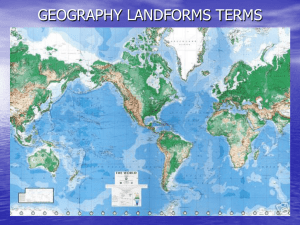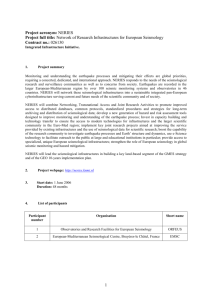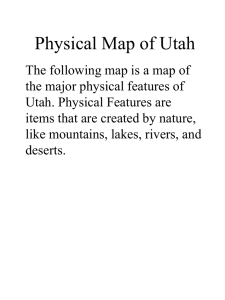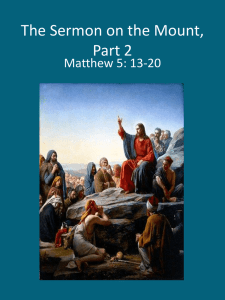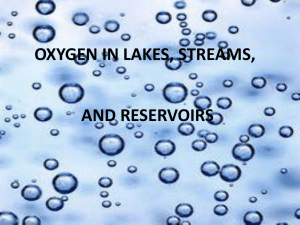Titel - Rohan - San Diego State University
advertisement
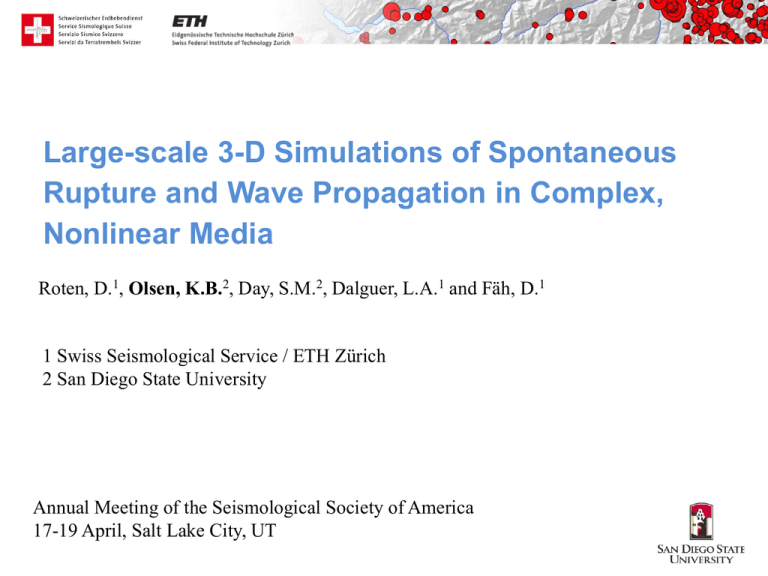
Large-scale 3-D Simulations of Spontaneous Rupture and Wave Propagation in Complex, Nonlinear Media Roten, D.1, Olsen, K.B.2, Day, S.M.2, Dalguer, L.A.1 and Fäh, D.1 1 Swiss Seismological Service / ETH Zürich 2 San Diego State University Annual Meeting of the Seismological Society of America 17-19 April, Salt Lake City, UT Introduction • Advances in computer codes and increases in computational resources enable numerical prediction of ground motions at increasingly higher frequencies, e.g.: - M8 up to 2 Hz (Cui et al., 2010) - Chino Hills EQ up to 5 Hz • Nonlinear behavior of soft soils should be taken into account when predicting ground motions at frequencies above ~1 Hz • Nonlinear material behavior may also occur in the damage zone around the fault (on- and off-fault plasticity; e.g. Andrews (2005), Ma (2008). Annual Meeting of the Seismological Society of America, April 17-19 2013, Salt Lake City, UT 2 Implementation of damage rheology in AWP-ODC Non-associative Drucker-Prager plasticity with yielding in shear (based on guidelines from SCEC/USGS Spontaneous Rupture Code Verification Project): Annual Meeting of the Seismological Society of America, April 17-19 2013, Salt Lake City, UT 3 Implementation of damage rheology in AWP-ODC Return map algorithm: Time-dependent relaxation (Andrews, 2005): Annual Meeting of the Seismological Society of America, April 17-19 2013, Salt Lake City, UT 4 Computational aspects • Staggering of grid requires interpolation of missing elements in stress tensor and initial stresses from adjacent nodes • Optimization that reduces number of interpolations results in significantly reduced computational cost Material model CPU time per iteration Normalized CPU time Elastic 0.18 s 100% Elastoplastic 0.68 s 378% Elastoplastic optimized 0.29 s 161% Annual Meeting of the Seismological Society of America, April 17-19 2013, Salt Lake City, UT 5 Verification against SCEC/USGS TPV13 • Spontaneous rupture on a planar, dipping fault (approximated by vertical fault in AWP-ODC) c = 5 Mpa tan(φ) = 0.85 Tv = 0 s Annual Meeting of the Seismological Society of America, April 17-19 2013, Salt Lake City, UT 6 Convergence test (vertical strike-slip fault) Annual Meeting of the Seismological Society of America, April 17-19 2013, Salt Lake City, UT 7 ShakeOut Earthquake Scenario • • Based on kinematic source description (Graves et al., 2008) visco-elastic medium Annual Meeting of the Seismological Society of America, April 17-19 2013, Salt Lake City, UT 8 ShakeOut Earthquake Scenario with Plasticity Annual Meeting of the Seismological Society of America, April 17-19 2013, Salt Lake City, UT 9 QuickTime™ and a Motion JPEG OpenDML decompressor are needed to see this picture. Annual Meeting of the Seismological Society of America, April 17-19 2013, Salt Lake City, UT 10 ShakeOut Earthquake Scenario with Plasticity Visco-elastic Visco-elasto-plastic Annual Meeting of the Seismological Society of America, April 17-19 2013, Salt Lake City, UT 11 ShakeOut Earthquake Scenario with Plasticity Final Principal Plastic Strain η at surface Annual Meeting of the Seismological Society of America, April 17-19 2013, Salt Lake City, UT 12 ShakeOut Earthquake Scenario with Plasticity Final Principal Plastic Strain η at z = 600 m Annual Meeting of the Seismological Society of America, April 17-19 2013, Salt Lake City, UT 13 Conclusions • We have implemented damage rheology based on the Drucker-Prager yield condition • • • • • into the highly scalable 3D finite difference code AWP-ODC The method has been validated against four finite element codes in the framework of the SCEC/USGS Spontaneous Rupture Code Verification Project Computational cost of modeling plasticity amounts to an additional ~60% of the CPU time required for an elastic simulation We simulate the ShakeOut-K earthquake scenario for a visco-elasto-plastic material, assuming that cohesions range from ~50 kPa in low-velocity sediments near the surface to several MPa at depth Our results suggest that long-period (< 2 s) ground motion in the Los Angles area, amplified by a wave guide of interconnected sedimentary basins, could be significantly reduced as compared to visco-elastic solutions Improved calibration of additional parameters (cohesion C and friction angle ϕ is required to reliably predict off-fault plasticity and nonlinear behavior of near-surface deposits Annual Meeting of the Seismological Society of America, April 17-19 2013, Salt Lake City, UT 14
